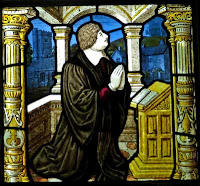 |
| A Proper Victorian Lady |
Most
writers have story where they experiment, let go, let their imagination run
wilder than they thought possible, and, sometimes, mix genres. A story I
wrote back in 2013 titled “The Mechanical Horses of Shandong Province,” did
just this. It’s the craziest story I ever penned. It was a
steampunk/vampire/multicultural/alt-history/romance sort of story. It takes
place in Edwardian era (the first decade of the Twentieth Century) in British
India. It deals with a British colonial woman who is a vampire but also a
scientist. She is trying to find a way to stop an invasion by Bhara Khan, a descendent of Genghis Khan who has conquered much of
China and has his eyes on British India. And she is involved with a young man on
the base.
Unusual combination, but as a story it managed
to work at least reasonably well, I think. Here is some of the basic plot.
 |
| British Fortress in India |
The reader learns early on that Catherine
Travers is a vampire. The opening scene finds her cleaning up from dining on
the blood of a victim she finds in the outback of India, transforming to a bat,
and flying back to meet with her colleagues at the British garrison where she
lives; the garrison also functions as a research laboratory. Catherine is working
on development of the what she calls
“cluster shells” (similar to our modern cluster bombs) that will, upon
exploding, send out a swarm of smaller projectiles that will also explode.
Bhara Khan’s cavalry is so skilled, and so numerous, that it can successfully
charge into artillery or at machineguns. The British team is working
frantically to develop a weapon that will stop him. Like many Victorians, Catherine was frightened of sex and had thought
to live in celibacy until she crossed over to the vampire world. Besides
unleashing a hunger for blood, it has unleashed her desire. She has found
someone to supply it, a young man named Wesley, who is, the text notes, surprised at her violence and passion
but satisfies her enough that they have stayed together.
Sitting down with her colleagues, Catherine
learns that they will receive a visit from Parnashri Navin, a local leader, and
a priestess/courtesan who practices sacred sex. Though she does not tell the
others there at the table, she knows Parnashri holds the key to defeating Bhara
Khan.
The two women met after Catherine became
stranded after a train wreck. Frantic to find shelter from the sun, she hides a
cave. She sees Parnashri dance in worship to Shiva and is mesmerized by
her: Catherine
thought she was the most beautiful woman she had ever seen. Her arms and legs
were long, her torso slender and muscled. She had large round breasts, smooth,
strong shoulders and a black glossy swath of hair where her legs met. Her feet,
long and narrow, moved with grace and elegance and her body followed their
flow. When they speak, Parnashri says she knows Catherine is a rakshasa, a vampire. She welcomes Catherine and
receives her into her home and her temple.
Parnashri tells Catherine
of the impending invasion. She also says the Chinese have delivered a weapon
they believe will defeat Bhara Khan’s cavalry.
These are mechanical
horses. They are not the kind one rides. They are weapons all in themselves.
The Chinese engineers give her a demonstration. They set a large number of
full-sized clay soldiers in a huge room and unleash the horses: The
things transformed to golden storms of violent motion. They reared, charged,
leaped, and turned in circles, legs lashing out, bodies whirling, heads
swinging from side to side, their broad hooves striking with lightning-flash
motion. Catherine hardly breathed as she watched the mechanical devices reduce
the clay figures to piles of shard in mere seconds. Catherine becomes
convinced these devices can defeat Khan. But how can she convince the others at
the research center of this?
When she learns that
Parnashri will visit the center, she begins to formulate a plan. The women
there are aghast that a woman who practices prostitution will be their guest.
Parnashri makes a good impression and offers to demonstrate the mechanical
horses. One of the Englishmen insults the Indian woman (so rudely even the
other British are shocked). Catherine storms off, but Eliot, the man who
insulted Parnashri, follows her. He accuses Catherine of collusion with the
Indians and threatens to reveal her relationship with Wesley.
 |
| Parnashri |
He does not know, of
course, that she is a vampire and that when vampires feel threatened they
react. Catherine turns into a wolf and kills Eliot.
She reverts to her
human form, smears herself with Eliot’ blood, and makes up a story about a wolf
getting into the compound and attacking her and Eliot. As she walks under the
moonlight with Wesley, her lover, she is confident, with this turn of
circumstances, that the British will allow a demonstration of the mechanical
horses, which the Chinese emperor has offered to supply them with for free.
The story appeared in
a now-defunct journal with the marvelous name, Professor Dobbs’
Historical Primer of the Extraordinary. It only ran
one issue. As C. S. Lewis said of a story he had published in a discontinued newspaper, “I hope the book did not hasten its demise.” The story, crazy and
quirky, had a limited readership, and, re-reading it, I liked it so much I may
try to find another home for it. Sometimes crazy and quirky is good.
If you are looking for a marvelous read, get a copy of my novella The Court of the Sovereign King.
Happy reading.























